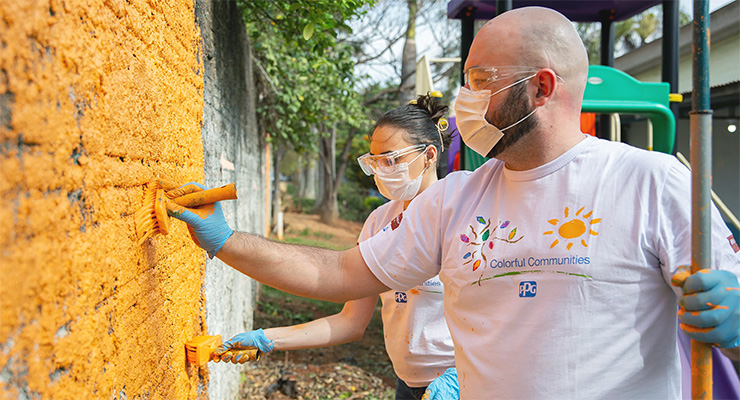Jennifer Dodson, PPG Director, Customer Sustainability04.11.23
Paints and coatings play a critical role in protecting the world’s resources. From preventing corrosion on vehicles and ships, to beautifying the world’s homes, to reducing smudging and scratches on electronic devices – the industry is vital to extending the useful life of countless products every day.
The recent World Coatings Council’s inaugural “Sustainability in the Global Paint and Coatings Industry” report highlights the global industry’s ongoing sustainability efforts and how these activities help to advance coatings science and manufacturing technologies. The report notes how essential paints and coatings remain as part of the overall manufacturing value chain, and the advantages manufacturers can provide to customers and suppliers.
By improving the durability of assets, the industry is supporting extended product lifecycles, circularity and reuse, while preserving both renewable and non-renewable sources for generations. Manufacturers must leverage this as a strategic advantage and prioritize the continued development of industry-leading sustainable solutions to meet customer needs.
Aluminum has a higher recycling rate and more recycled content than competing package types. More than 100,000 aluminum cans are recycled each minute in the U.S. – leading to an overall recycling rate of nearly 50%, the highest rate for any beverage container. Additionally, 75% of all aluminum produced is still in circulation due to its infinite recyclability.
PPG is helping to create a more circular business model for safe and durable packaging while helping companies achieve sustainable commitments through innovations such as PPG INNOVEL PRO interior beverage can coating. The technology uses no bisphenol and non-bisphenol starting substances, provides better product protection, and enables aluminum cans to reach their full circularity potential. It also offers consumer brands a viable solution to meet sustainable packaging commitments. In fact, PPG’s Innovel PRO interior can lining has coated more than 220 billion cans and has earned a Cradle to Cradle Certified Material Health Certificate at the Platinum level.
Historically, the paint shop has been the most energy intensive area of automotive OEM facilities, presenting a strong opportunity for paints and coatings manufacturers to help their customers decarbonize. One of PPG’s most recent innovations under the electrocoat offering, the PPG ENVIRO-PRIME EPIC 200R product, can be applied to EV assemblies with heavier metal mass using less energy and heat, resulting in a reduction of CO2 emissions. The product is also water-based and generates minimal waste due to its application efficiency.
In addition, historically, the maritime shipping sector has faced challenges on its journey to decarbonization. Although zero-carbon fuels and technologies might not yet be ready for wide-scale adoption, shipowners can turn to paints and coatings to support their sustainability goals.
One example that helps support the maritime industry’s transition is PPG SIGMAGLIDE 2390 marine coating, which helps shipowners lower energy consumption and carbon emissions and meet demands for higher performance without adverse impact on the marine environment. A revolutionary technology, the marine coating helps shipowners lower power consumption and carbon emissions. The biocide-free fouling release formula is based on the revolutionary PPG HYDRORESET technology, which modifies the coating when immersed in water to create a super-smooth, almost friction-free surface that marine organisms do not recognize and cannot adhere to.
Based on third-party evidence following ISO 19030 and International Towing Tank Conference standards, this coating allows vessels to maintain a clean hull and reduce drag, achieving power savings of up to 20%, a speed loss performance of less than 1%, and up to 35% reduction in CO2 emissions in comparison with traditional antifouling coatings.
To learn more visit sustainability.ppg.com.
The recent World Coatings Council’s inaugural “Sustainability in the Global Paint and Coatings Industry” report highlights the global industry’s ongoing sustainability efforts and how these activities help to advance coatings science and manufacturing technologies. The report notes how essential paints and coatings remain as part of the overall manufacturing value chain, and the advantages manufacturers can provide to customers and suppliers.
By improving the durability of assets, the industry is supporting extended product lifecycles, circularity and reuse, while preserving both renewable and non-renewable sources for generations. Manufacturers must leverage this as a strategic advantage and prioritize the continued development of industry-leading sustainable solutions to meet customer needs.
How Coatings Support The Circular Economy
As an example, a McKinsey and Company survey shows that fewer than 30% of companies report being well-prepared to meet their sustainable packaging commitments. Consumer packaged goods brands, such as beauty, food or beverage companies, often adopt circular packaging, such as aluminum, as a more sustainable solution.Aluminum has a higher recycling rate and more recycled content than competing package types. More than 100,000 aluminum cans are recycled each minute in the U.S. – leading to an overall recycling rate of nearly 50%, the highest rate for any beverage container. Additionally, 75% of all aluminum produced is still in circulation due to its infinite recyclability.
PPG is helping to create a more circular business model for safe and durable packaging while helping companies achieve sustainable commitments through innovations such as PPG INNOVEL PRO interior beverage can coating. The technology uses no bisphenol and non-bisphenol starting substances, provides better product protection, and enables aluminum cans to reach their full circularity potential. It also offers consumer brands a viable solution to meet sustainable packaging commitments. In fact, PPG’s Innovel PRO interior can lining has coated more than 220 billion cans and has earned a Cradle to Cradle Certified Material Health Certificate at the Platinum level.
How Coatings Support A Lower-Carbon Economy
Like many industries, automotive original equipment manufacturers (OEMs) are looking across their entire supply chain for opportunities to reduce their environmental impact. While it’s clear that electric vehicles (EVs) are key enablers of the transition to a low-carbon economy, suppliers must be prepared to support this transition with alternative low-carbon products and processes.Historically, the paint shop has been the most energy intensive area of automotive OEM facilities, presenting a strong opportunity for paints and coatings manufacturers to help their customers decarbonize. One of PPG’s most recent innovations under the electrocoat offering, the PPG ENVIRO-PRIME EPIC 200R product, can be applied to EV assemblies with heavier metal mass using less energy and heat, resulting in a reduction of CO2 emissions. The product is also water-based and generates minimal waste due to its application efficiency.
In addition, historically, the maritime shipping sector has faced challenges on its journey to decarbonization. Although zero-carbon fuels and technologies might not yet be ready for wide-scale adoption, shipowners can turn to paints and coatings to support their sustainability goals.
One example that helps support the maritime industry’s transition is PPG SIGMAGLIDE 2390 marine coating, which helps shipowners lower energy consumption and carbon emissions and meet demands for higher performance without adverse impact on the marine environment. A revolutionary technology, the marine coating helps shipowners lower power consumption and carbon emissions. The biocide-free fouling release formula is based on the revolutionary PPG HYDRORESET technology, which modifies the coating when immersed in water to create a super-smooth, almost friction-free surface that marine organisms do not recognize and cannot adhere to.
Based on third-party evidence following ISO 19030 and International Towing Tank Conference standards, this coating allows vessels to maintain a clean hull and reduce drag, achieving power savings of up to 20%, a speed loss performance of less than 1%, and up to 35% reduction in CO2 emissions in comparison with traditional antifouling coatings.
Together for Sustainability
While the industry’s priority is supporting evolving customer needs, every touchpoint along the value chain has responsibility to support decarbonization and a more circular future. The global paints and coatings industry should continually seek to use resources efficiently, develop value-added sustainable solutions and minimize their operational footprint. This industry remains critical in contributing to a building a better, more sustainable future for customers, suppliers and communities.To learn more visit sustainability.ppg.com.




